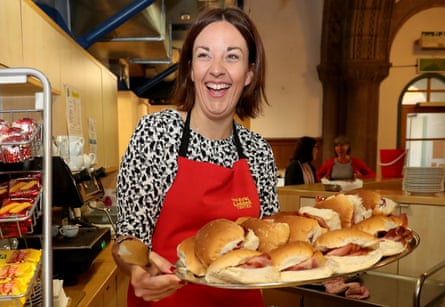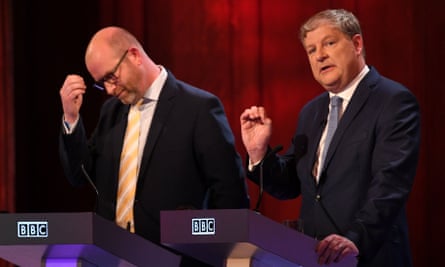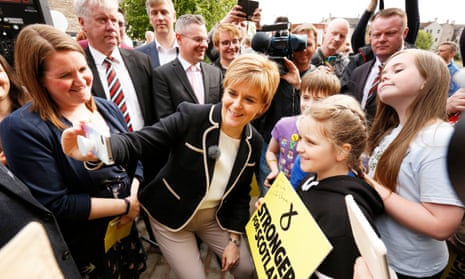The Scottish National party is braced for the loss of up to a dozen Westminster seats in the general election, with the Conservatives and Liberal Democrats threatening to inflict defeats in its rural heartlands.
Senior figures in Nicola Sturgeon’s party predict the Moray seat held by its Westminster leader, Angus Robertson, and the neighbouring seat of Banff and Buchan could fall to the Conservatives if enough voters endorse Brexit and switch sides to block a second independence referendum.
The latest opinion polls show the SNP vote has fallen to 41% – from a high of 54% before the 2015 general election – while Scottish Labour’s vote has increased sharply from a low of 13% to 25%, echoing a growth in Labour support in England and Wales.
The threat of significant losses has pushed Sturgeon into an attack on the integrity of the Scottish Labour leader, Kezia Dugdale, to weaken the party’s support.
Speaking at first minister’s questions on Wednesday – brought forward a day to avoid clashing with the election – Sturgeon repeated her claim that Dugdale had privately told her she thought Labour should back a second Scottish independence referendum the day after Scotland voted to stay in the EU, but was outvoted by England and Wales.

Sturgeon alleged during an STV leaders’ debate on Tuesday that Dugdale had told her “she thought Brexit changed everything and she didn’t think Labour could go on opposing a second referendum”.
In heated exchanges at Holyrood, Sturgeon accused Dugdale of misleading voters about her beliefs on independence. She claimed she was justified in leaking that discussion because Dugdale had selectively disclosed other parts of it in an interview with the Times.
Dugdale, who said she had not revealed to the Times anything that Sturgeon had said to her, said Sturgeon was desperate to “say anything to deflect from the SNP’s appalling record” after 10 years in government in Edinburgh.
Sturgeon’s allegations are seen as a boost to the Scottish Tories, whose polling support has fallen slightly as questions have emerged about Theresa May’s style and the Conservative manifesto.
Sturgeon’s opponents believe the leak was intended to damage Labour’s chances of beating the SNP in several seats which the Tories are also fighting, including East Renfrewshire and East Lothian. Both seats have significant unionist votes, and the claims against Dugdale could shift voters to the Tories, deeply splitting the anti-SNP vote.
The SNP is braced for a difficult night: some SNP figures believe losing eight seats would be a good result for the party; others believe 15 seats are at risk. It all hinges on turnout and the extent to which tactical voting, against the SNP and a second referendum, plays a part.

Labour strategists say the Corbyn surge has put the party back in contention in several former heartland seats, including Gordon Brown’s old constituency of Kirkcaldy and Cowdenbeath. Although the party believes it can heavily cut SNP majorities in numerous seats, expectations of significant Labour gains in Scotland remain low.
The Tories expect to win at least six SNP seats, including all three constituencies along the English border, as well as East Renfrewshire near Glasgow and the wealthy rural constituency of West Aberdeenshire and Kincardine.
But Conservative sources say that if the Tory vote hits 30% in Scotland, more than a dozen SNP seats could tumble, including the key seat of Perth and North Perthshire held by Pete Wishart, the SNP chair of the Scottish affairs select committee at Westminster.
That seat or its predecessors has been SNP for 22 years. Sturgeon’s election manifesto launch was moved there to bolster Wishart’s campaign to hold it against the Tory surge, which has gathered momentum after the Brexit vote.
John Lamont, who resigned as a Tory MSP and Tory chief whip at Holyrood to stand in Scotland’s most marginal constituency, the Borders seat of Berwickshire, Roxburgh and Selkirk, said Conservative voters are now happy to publicly say so for the first time in decades.
After the Tories won 31 Holyrood seats last year and took 25% of first preference votes in May’s council elections, “people across Scotland now know that they can vote Conservative and get Conservatives elected”, he said. Lamont is widely expected to win Berwickshire, Roxburgh and Selkirk, which the SNP holds with a slender 328 vote majority.
The Liberal Democrats believe they can seize back at least three former seats lost in 2015, when the SNP won a historic 56 of Scotland’s 59 Westminster seats. The Lib Dems are favourite to retake Edinburgh West, East Dunbartonshire – where the former equalities minister Jo Swinson is campaigning to regain the seat – and Caithness, Sutherland and Easter Ross.
Willie Rennie, the Scottish Lib Dem leader, said: “There is a mood in Scotland just now which is generally fed up with the constant pressure to get another independence referendum. And people are getting really angry.”
He said that the Lib Dems’ very low national polling rating of 5% in Scotland masked significant support for the party in key constituencies, including in North East Fife, previously held by the former UK party leader Sir Menzies Campbell.
“Where you can convince people you are the challenger, you are the recipient. It is not necessarily a Conservative vote. It’s not necessarily a Labour vote. It’s an anti-independence vote.”









Comments (…)
Sign in or create your Guardian account to join the discussion